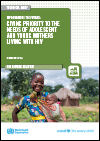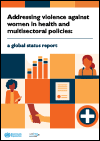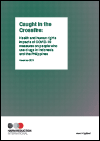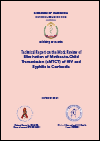What's New
Displaying results 371 - 380 of 4913

Resource | Publications,
Multiple agencies and actors have voiced their concerns around the exclusion of pregnant women from clinical trials and the associated harm and risks of these policies. More recently, the importance of allowing pregnant women the opportunity to take part in clinical trials has received renewed attention during the COVID-19 pandemic.
Recognizing the urgency of addressing this issue, the IMPAACT Network and WHO held a workshop to refine optimal approaches to studying the safety and efficacy of new HIV-related drugs during pregnancy and to establish the next steps for creating materials and methods that would support the implementation of such studies.

Resource | Publications,
In 2019, WHO and Coalition for Children Affected by AIDS convened a learning session of scientific and programmatic experts to consolidate the evidence on why HIV-affected adolescent mothers and their children are being left behind and to deliberate on the multiple-level changes needed to improve their outcomes. This technical brief follows on from that session and will be useful to HIV programme managers in health ministries and other adolescent- and youth-linked line ministries, especially those in in sub-Saharan Africa, in implementing, monitoring and evaluating adolescent and youth-responsive and -friendly health services for young mothers living with HIV.
This technical brief aims to inform and support global dialogue and accelerate action on prioritizing services and support for adolescent and young mothers living with HIV. It details core programmatic examples and key strategies actions from across sub Saharan Africa that demonstrate how governments, health facilities, social services, communities, families and adolescent and young mothers are working together to bridge the gap between adolescent and adult-focused HIV and maternal health services. The programme examples provided serve to highlight potential and ongoing learnings in countries.

Resource | Publications,
The purpose of this global status report is to present an assessment of the extent to which countries’ policies align with WHO’s recommendations, evidence-based strategies, and with international norms and standards related to human rights and gender equality.
This report is being published at a time when the COVID-19 pandemic has contributed to an increase in exposure to IPV/domestic violence and an increase in reports of violence against women. COVID-19 response measures in the form of lockdowns and stay-at-home regulations have placed increased economic stress on households, have put a greater care burden on women and increased their exposure to violence in the home. At the same time, the pandemic has decreased the availability of social support and access to services.

Resource | Publications,
The Strategy is aligned with and advances the commitments made by Ministers of Health at the Seventy-fourth session of the Regional Committee through the Declaration on COVID-19 and measures to build back better essential health services to achieve UHC and the health-related SDGs. It recognizes that while COVID-19 has highlighted critical health system gaps, it has also catalysed or expanded innovations in community engagement, digital technology and reorganizing primary care services. It is intended to be a living document that will be reviewed throughout the implementation period.
Resource | Publications,
Universal health coverage (UHC) means that everyone receives quality health services, when and where they need them, without incurring financial hardship.
Before COVID-19 struck, the world was far short of reaching the Sustainable Goal (SDG) 3.8 targets and the goal of 1 billion more people benefiting from UHC by 2023.
Since 2000, service coverage has increased as average income has grown, but at an undue cost to many people. Trajectories on the path to UHC, as tracked by related SDG indicators on service coverage and financial hardship, vary substantially across WHO regions and countries. Country-level analysis of coverage policy is needed to identify gaps in health coverage, understand their causes and develop appropriate policy responses.

Resource | Publications,
COVID-19, as well as government responses to the pandemic, are having unprecedented impacts on peoples’ lives, and are exacerbating vulnerabilities and inequalities. Since the early stages of the pandemic, many governments have resorted to securitised strategies centred around control and punishment, often leading to policies skewed towards repression and control, rather than health, transparency, and socio-economic support. Furthermore, the expansion of law enforcement powers has in several contexts resulted in increased criminalisation, surveillance, and targeting. As a result, populations already vulnerable and marginalised have experienced heightened policing, discrimination, and detrimental impacts on their rights and health.
While the impacts of these policies on vulnerable communities such as women, migrant workers, and refugees are well-documented, less information is available on the repercussions on the rights and health of people who use drugs and their communities. This report presents and analyses the findings of research conducted with and among people who use drugs, service providers, and community paralegals in Indonesia and the Philippines, exploring how COVID-19 measures impacted on their livelihood, security, health, and human rights.

Resource | Publications,
This paper highlights specific and inspiring examples of positive shifts in policy, programme and service delivery as well as rights protections for people living with and at greatest risk of HIV, in response to the COVID-19 pandemic. It draws on powerful examples from the Partnership to Inspire Transform and Connect the HIV response (PITCH) – a strategic partnership between Aidsfonds, Frontline AIDS and the Dutch Ministry of Foreign Affairs that ran between 2016 and 2020. PITCH enabled people most affected by HIV to gain full and equal access to HIV and sexual and reproductive health and rights services.

Resource | Fact Sheets,
Different countries, including Nepal, implemented several strategies to contain the spread of severe acute respiratory syndrome coronavirus 2 (SARS-CoV-2). One of the important strategies adopted against coronavirus disease 2019 (COVID-19) was the announcement of national-wide shelter in place so-called lockdown. COVID-19 pandemic has caused major disruptions in the implementation of health services and diverting most of the resources and efforts to contain the COVID-19 pandemic also fuel the underachievement of activities of different health programme, including achievement of national HIV programme. This fact sheet aimed to present basic description of extent to which programmatic activities affected in terms of key indicators during COVID-19 situation using routine program data.

Resource | Publications,
The Annual report of National STD/AIDS Control Programme (NSACP) is a reliable source of reference to both programmatic and clinical services provided by the National STD/AIDS Control Programme including its islandwide network of STD clinics and other stakeholders.
NSACP has taken important steps towards achieving national and international goals. The country has achieved the WHO certification for the Elimination of Mother to Child Transmission (EMTCT) of HIV and syphilis. National STD/AIDS Control Programme (NSACP) further scaled up the roll out of its electronic medical record system named Electronic Information Management System (EIMS) during 2020. In addition, a new software named Prevention Information Management System (PIMS) is being developed to monitor the HIV prevention programme which is done in collaboration with the non-governmental stakeholders.

Resource | Publications,
The goals of this virtual “mock review” are for the National PMTCT program to assess its progress towards EMTCT of HIV and syphilis using the WHO tools and indicators for validation of EMTCT, to identify challenges and what is needed to be done in order to meet the validation requirements in the required timeframes. The review was conducted from June – September 2021 by 4 component sub Technical Working Groups (TWG ) focusing on Programme, Data, Laboratory, and Human Rights (HR), Gender Equality (GE), and engagement of Civil Society (CS). Each National component sub TWG was supported by an independent regional expert and an additional regional expert explored the role of the private sector in PMTCT.





